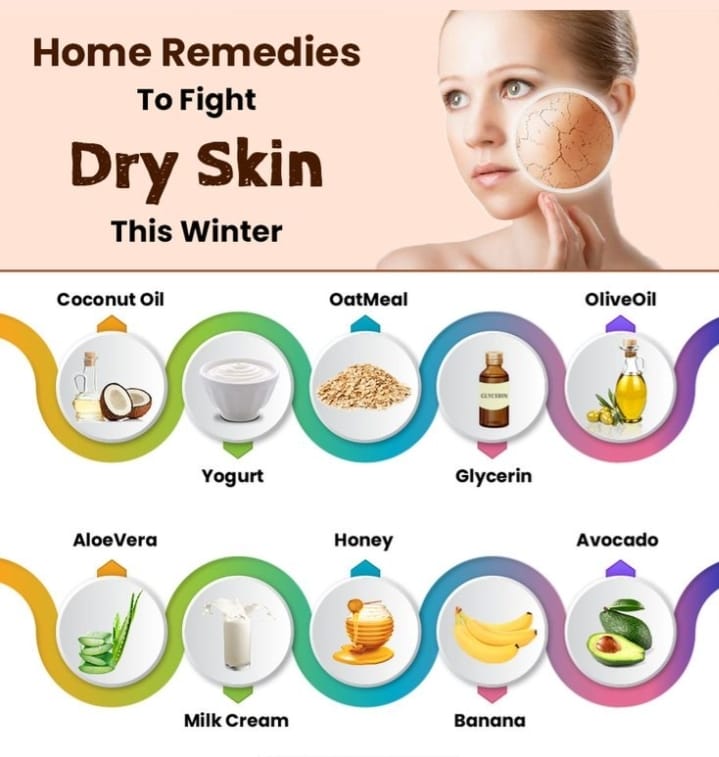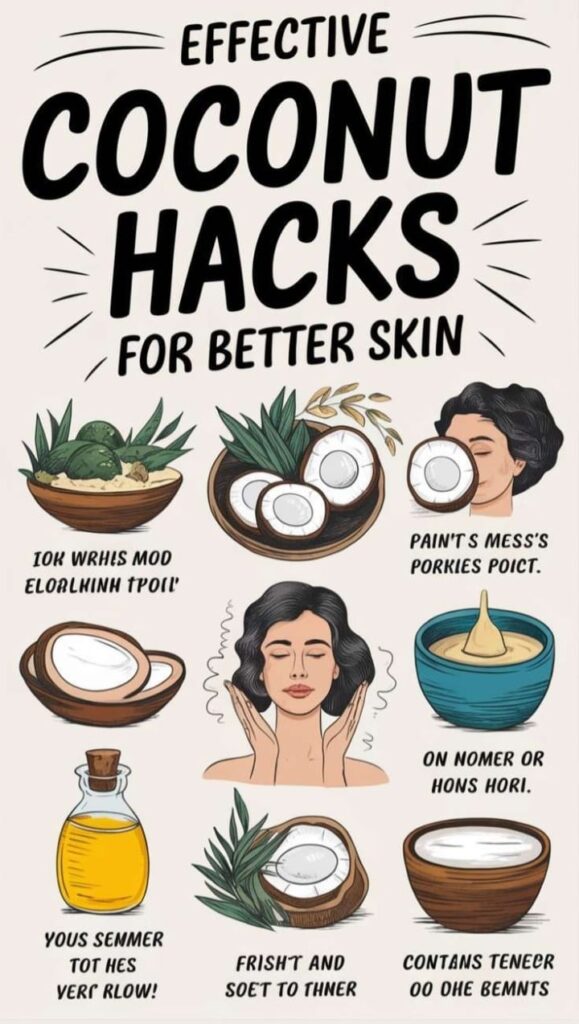
If your dry and flaky skin often feels tight, rough, or irritated, it’s a sign that your skin barrier needs extra care and hydration. Seasonal changes, long hot showers, and harsh soaps can strip away natural oils, leaving your skin dull and dehydrated. Thankfully, several natural remedies can help moisturize dry skin naturally and repair the skin’s dry barrier. Searching for the best home remedies for dry skin? These natural solutions will keep your skin soft and hydrated.
Simple DIY skincare solutions for dry skin, such as using coconut oil, oatmeal, or aloe vera, can help restore moisture and lock in hydration for smoother, softer, and healthier-looking skin. These gentle home remedies for dry skin not only improve texture but also boost your skin’s ability to retain moisture naturally. These home remedies for dry skin help lock in moisture and restore your skin’s natural softness. Simple home remedies for dry skin can restore your natural glow without any chemicals.
Here is the best research on dry skin and remedies. Click here.
Coconut oil is one of the most effective natural remedies for dry skin. It contains fatty acids and antioxidants that nourish, moisturize, and repair the dry skin barrier. Using cold-pressed coconut oil after a shower helps lock in moisture, soothe itching, and make rough skin soft and smooth. Apply a small amount before bedtime to deeply hydrate dry and flaky skin overnight.
To keep your skin soft and hydrated all year long, don’t forget to check out our detailed guide on the best moisturizers for dry skin for extra nourishment and protection. If you’re tired of dull, patchy skin, try these simple home remedies for dry skin for visible results. These home remedies for dry skin are perfect for fighting flakiness and dullness.

Petroleum jelly (Vaseline) works as a powerful occlusive moisturizer that seals hydration into the skin. It’s ideal for people with extremely dry or cracked skin, especially on hands, feet, and elbows. Forming a protective barrier, it prevents water loss and keeps your skin smooth and supple. Dermatologists often recommend petroleum jelly for dry skin due to its simplicity and effectiveness. Natural oils and masks are among the most effective home remedies for dry skin you can use daily.

An oatmeal bath is a centuries-old home remedy for dry, itchy, and irritated skin. The natural beta-glucans and antioxidants in oatmeal help soothe inflammation, calm irritation, and restore moisture balance. Add finely ground colloidal oatmeal to warm (not hot) bathwater and soak for 10–15 minutes to relieve dryness and leave your skin soft and nourished. Winter is the best time to start following these home remedies for dry skin to lock in moisture.
Consuming foods rich in antioxidants and omega-3 fatty acids is a great way to moisturize dry skin naturally from within. These nutrients reduce inflammation, strengthen the skin barrier, and improve elasticity. Add avocados, walnuts, chia seeds, and salmon to your diet to support skin hydration and prevent flakiness. Topical serums with vitamin E and green tea extract also boost moisture retention.
Frequent washing and exposure to detergents can worsen dry and flaky skin, especially on hands. Wearing protective gloves while cleaning or washing dishes helps prevent moisture loss and shields skin from irritants. In winter, soft cotton or wool gloves also keep hands hydrated and crack-free. Follow up with a rich hand cream or petroleum jelly for extra hydration and protection.
Hot showers may feel relaxing, but can strip away your skin’s natural oils, leading to dehydration and irritation. Switch to lukewarm water and use a gentle, fragrance-free cleanser to protect your skin barrier. After bathing, pat your skin dry and immediately apply a moisturizer for dry skin to lock in hydration and restore softness.
Indoor heating and air conditioning can make the air dry, worsening skin dehydration. Using a humidifier adds moisture to the environment, helping your skin retain hydration naturally. Place one in your bedroom or workspace to keep your skin soft and supple during winter or dry seasons.
Harsh soaps, fragrances, and strong detergents can trigger irritation and worsen dry, flaky skin. Always choose hypoallergenic, fragrance-free products designed for sensitive and dry skin types. Avoid wearing wool directly on your skin, and patch-test new products before applying them to your face or body. This helps prevent allergic reactions and keeps your skin barrier healthy. The best part about these home remedies for dry skin is that they use easily available ingredients.
While home remedies can heal dryness, the key to long-term results is preventing dry skin before it starts. Keep your skin hydrated by drinking plenty of water and using a moisturizer for dry and flaky skin twice a day—especially after bathing. Choose fragrance-free, gentle cleansers, and avoid hot water showers that strip natural oils. Use a humidifier indoors during dry seasons to restore moisture in the air, and wear protective gloves when doing household chores to minimize exposure to harsh detergents. Incorporating these dry skin prevention tips into your daily routine helps maintain a healthy, soft, and nourished skin barrier year-round.
Sometimes, home remedies for dry skin may not be enough—especially if your skin becomes cracked, inflamed, or itchy despite regular moisturizing. Persistent dry patches, redness, or peeling can indicate conditions like eczema, psoriasis, or dermatitis, which require professional care. You should see a dermatologist if dryness spreads or causes discomfort. A dermatologist can identify the underlying causes of chronic dryness and recommend suitable prescription creams or medicated moisturizers to help repair the skin barrier effectively. Dermatologists often recommend natural home remedies for dry skin before turning to chemical treatments.
Dealing with dry and flaky skin is common, but the right care can make all the difference. Simple DIY skincare for dryness using ingredients like coconut oil, oatmeal, and aloe vera can deeply moisturize and restore hydration. Pair these natural remedies for dry skin with lifestyle habits like shorter showers, gentle cleansers, and proper hydration to achieve lasting softness. Remember—consistent care, barrier protection, and mindful product choices are the best ways to lock in moisture and keep your skin glowing, supple, and healthy.
Dealing with dry and flaky skin doesn’t always require expensive treatments—sometimes, the most effective solutions are already in your kitchen. By using natural remedies for dry skin like coconut oil, oatmeal, and aloe vera, you can moisturize dry skin naturally and restore lost hydration without chemicals. These gentle ingredients help repair the dry skin barrier, reduce irritation, and lock in moisture for lasting smoothness.
Along with DIY skincare for dryness, simple lifestyle habits—like using a humidifier, avoiding harsh soaps, and maintaining a balanced diet rich in omega-3s and antioxidants — can make your skin soft, glowing, and healthy. Remember, consistency is key; nourishing your skin daily helps it heal from within and stay hydrated all year long.
1. What is the best home remedy for dry and flaky skin?
The best home remedies include coconut oil, aloe vera, and oatmeal baths. These natural ingredients deeply moisturize dry skin, soothe irritation, and help restore the skin’s moisture barrier.
2. How can I moisturize my dry skin naturally?
Use DIY skincare remedies like coconut oil or shea butter after showering to lock in moisture. You can also apply aloe vera gel or glycerin-based moisturizers to hydrate and repair dry skin naturally.
3. What causes dry and flaky skin?
Common causes include cold weather, long hot showers, harsh soaps, dehydration, and lack of essential fatty acids. These strip away natural oils and damage your skin barrier, leading to dryness and flakiness.
4. Which ingredients should I look for in products for dry skin?
Look for ceramides, hyaluronic acid, glycerin, squalane, and shea butter. These ingredients help retain moisture, strengthen the skin barrier, and leave your skin soft and supple.
5. When should I see a dermatologist for dry skin?
If your skin becomes painful, cracked, red, or scaly despite regular moisturizing, it’s best to see a dermatologist. Persistent dryness could indicate eczema, dermatitis, or psoriasis, which require professional treatment.
6. How can I prevent dry skin naturally?
Follow dry skin prevention tips like using a humidifier, avoiding hot water baths, drinking enough water, wearing protective gloves, and applying moisturizer immediately after washing. These small habits help maintain hydration and prevent flaky skin.
No comments yet. Be the first to comment!
You must be logged in to post a comment.

Recent Comments